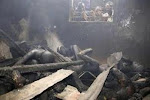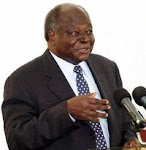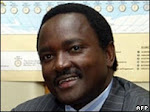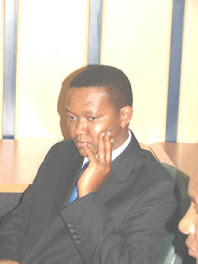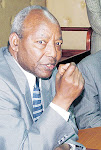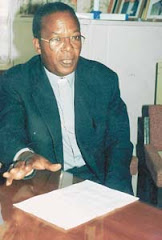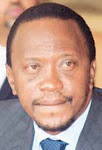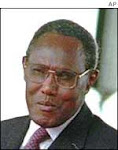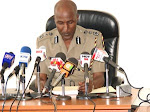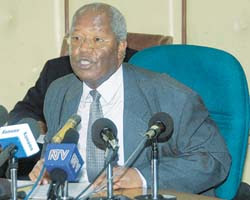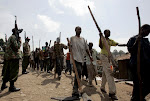 Recent media reports (The People On Sunday May 4, 2008) about a fierce war by officers at the Primier's office barely scratch the bottom of what is really at stake for Raila Odinga and ODM. The man drawing discontent in the Orange Democratic Movement (ODM) is Dr. Mohammed Isahakia, erstwhile head of the ODM Presidential Campaign Secretariat, former director of National Museums of Kenya and former Permanent Secretary (PS) whom Moi sacked severally under controversial circumstances and now the re-invented boss at the critical PM's office.
Recent media reports (The People On Sunday May 4, 2008) about a fierce war by officers at the Primier's office barely scratch the bottom of what is really at stake for Raila Odinga and ODM. The man drawing discontent in the Orange Democratic Movement (ODM) is Dr. Mohammed Isahakia, erstwhile head of the ODM Presidential Campaign Secretariat, former director of National Museums of Kenya and former Permanent Secretary (PS) whom Moi sacked severally under controversial circumstances and now the re-invented boss at the critical PM's office.
He is the only PS in the history of civil service re-appointed to public office while still facing misuse of office allegations in court in addition to being past retirement age. He is such a persona that his support base (Muslims) and party (ODM) fraternity do not want him near any decision–making but the Prime Minister is weighed down with him.
He is also the "enemy within" that party bigwigs and strategists tag for spirited sabotage manoeuvres of the ODM electioneering campaigns, misuse of campaign funds, fiasco in cabinet portfolio balance in power-sharing negotiations and short-changing in public service appointments, but who has been planted on the PM as his closest minder.
Recent reports of infighting within the PM's office and disquiet within ODM hierarchy is but a tip of the iceberg as the PM faces credibility questions from his own party. Members of the Pentagon, cabinet ministers and large pools of professional support groups cite lack of integrity by officers in his office. Prime Minister Raila Odinga is indeed in danger of squandering an image build over the years as a man after real change in governance.
Premier's Office in Disarray
The recent squabble might seem to be between Dr. Isahakia and Raila's close political aide, the Secretary of Administration at the PM's office, Mr. Caroli Omondi; but the gulf runs much deeper. On the PM's instruction, Mr. Omondi wrote to the Justice Aaron Ringera-headed KACC asking for a brief on the controversially alleged handover of Grand Regency Hotel by Kamlesh Patni, of the Goldenberg infamy. Mr. Omondi, a lawyer and ODM liaison officer at the on-going Serena Mediation talks signed off as the "Chief of Staff" for the PM.
Apparently upset that Raila had overlooked him in "protocol", Dr. Isahakia is said to have appealed to newfound confidante - the Head of Civil Service Mr. Francis Muthaura - to put the record straight on the pecking order at the PM's office. Motivating Isahakia was the desire to spite the PM amidst suspicion that the PM is already overwhelmed by appeals to cut him loose. In an offhand rude putdown to Raila and Omondi, Muthaura - in the now-famous insolent manner he has come to treat the PM - did not let his buddy down; he was least bothered with courtesies and official channels.
He contemptuously let fly through the media his disdain for Raila; Muthaura was categorical that no one will bother with a reply since government structures had no "chief of staff" and only Dr. Isahakia could author such requests. This is despite the letter downright stating that "I have been directed by the Rt. Hon. Prime Minister…" Insubordination is the strategy to Muthaura has chosen to let the PM know his place.
The relationship between Muthaura and Dr. Isahakia is intriguing and a source of great anxiety within ODM. In the heat of disagreements over portfolio balance, the two were used as point's men by President Kibaki and Prime Minister Raila respectively in heated correspondence, when one-on-one meetings failed. Dr. Isahakia was the errand boy for ODM on "portfolio balance" in meetings with Muthaura for PNU. It through these engagements that the two developed a conspiratorial working rapport.
Back to ODM portfolio balance negotiations, a red flag was first raised when media leaks begun to portray ODM as constantly conceding on its "irreducible minimum" in portfolio balance. Sources say that "coincidences were too many" when approved "portfolio balance" presentations to PNU were concisely substituted with new ones once in the hands of Isahakia.
"It was baffling. For instance, the strategists would work on a document and fine tune it for presentation. But between Isahakia's offices for the PM's approval, the document would acquire different proposals. Of course the PM would assume that the changes were by the strategy team as it had been presented to him!" said a distraught official. He cited the leak that portrayed ODM ceding Foreign Affairs, Internal Security and Finance to PNU even before any discussion was held as a fake document that was traced back to an Isahakia sidekick at Pentagon House.
It was determined that Isahakia had been "turned" in espionage to ensure a favourable deal for PNU because he was "too compromised" by his past. In his mole role, Isahakia was/has strategically been placed to feed Raila with misinformation. Henceforth Isahakia would not meet alone with Muthaura. He would be shadowed by Mr. Caroli Omondi, Dalmas Otieno and Amukowa Anagwe.
However, Isahakia would pull a first one; he recruited Dalmas Otieno and Amukowa Anagwe into his confidence. At Sagana where 'portfolio balance' was agreed only Isahakia and Muthaura and the two principals were present. It is noteworthy that not even the highest decision-making organ – Pentagon - at ODM was aware of Sagana. Subsequently Isahakia would evade 'his tails' in meetings with his new-found villain Muthaura to fine tune the agreement and finalise appointments to cabinet and civil service that has became the source of fury in ODM.
"It is uncanny how Isahakia connived to meet alone with Muthaura and agree on PS allotments and then tell a tall story as already plotted by them to the PM", said an ODM MP.
Plot to Fix Raila's Reputation
In a much Isahakia's positioning is a source of ire, diehard supporters of the PM fear that it is an insidious long-term PNU plot to politically fix Raila. To begin with among the presidential candidates, it only the Raila Odinga who presented himself as "Mr. Clean" and on behalf ODM promised to fight corruption. In the campaigns, Raila would scold opponents as representing "business as usual" in reference to their alleged corrupt backgrounds in public perception.
"It comes as shocking and alarming to supporters that the PM has within his office people with stained and dubious reputations" , said a professional from Nyanza.
Supporters are worried that apart from Isahakia himself, the latter in complicity with Muthaura is busy recruiting into PM's office wheeler dealer Tony Gachoka as a Senior Assistant Secretary for protocol and a Major Idris who left the armed forces procurement department under a dubious cloud as a Deputy Secretary. This is being done without following laid down procedures indicating the length head of public service, Muthuara is prepared to prop up his friend and go to have PNU-friendly insiders around the PM.
Most of PM's close confidants are lost for words that their interventions to have the PM cut loose Dr. Isahakia have hit a brick wall. Dr. Isahakia continues to call the shots even as he continues, according to ODM insiders, "to mislead the PM into PNU traps at every corner". It is in this light that Raila is said to be quietly shifting political responsibilities to Mr. Omondi prompting Isahakia to wage insurgency in cohorts with Muthaura.
"We sincerely do not know where the Captain got this man and why", said an irate ODM Pentagon member when asked about Isahakia's recruitment as campaign head adding he found the PS "lazy, manipulative and inopportune" . "He confessed to me that he knew nothing about managing campaigns and proved it", he said.
"I can tell you the man is incapable of writing a simple memo", said a former minister whose sentiments were supported by a member of ODM strategy team who had to re-draft "juvenile" memos from Isahakia.
"We don't know this man'
However, insiders told us that Dr. Isahakia as the ODM Presidential Campaign Secretariat head was part of the deal in the contentious and debilitating "Muslim MOU" authored by NAMLEF, the Muslims lobby group that was at the centre of the debate during that 2007 campaigns. In the course of the campaigns, however, it transpired Dr. Isahakia abandoned the Muslim agenda and became a material broker for vested interests in the party nominations, especially Muslim parliamentary constituencies. Furthermore, the source claimed, campaign funds released to the area never reached the intended beneficiaries. They cite a case of Ksh.1m meant for a coordinator who only received Ksh200, 000 from Dr. Isahakia.
"He is responsible for the fiasco that saw us loose ground in North Eastern to PNU as he substituted strategic parliamentary candidates with his cronies in the area for some consideration. Somehow, most of his recommended candidates lost to PNU", said a party strategist from the region who sought anonymity.
As if these were not enough, the Muslim community feels short-changed in the recent PS appointment by ODM which led to a delegation that asked the PM to fire his PS. Sources in NAMLEF say that Dr. Isahakia colluded with PNU to ensure that names for ODM Muslim appointees to PS positions, like the those from other regions, were replaced by PNU appointees.
Players in the on-going saga who fear that there is a larger PNU plot to isolate the PM from his support bases point out that PNU is already using its manipulation of PS appointments to its advantage in ODM support areas. "I can tell you that other than one Secretary, none of those PSs with Muslim names are ODM supporters", said an NAMLEF official.
The story is the same everywhere; Kanu is busy taunting ODM in Rift Valley since all PS appointees are its supporters to the chagrin of ODM Kalenjin professionals. In Western, ODM was even upstaged by ODM-K and Ford-Kenya where they got one PS each to none for ODM! In addition, Kibaki retained his previous appointees.
More recently, there are unconfirmed reports circulating among Muslims that ODM cabinet and PS positions were "bought" for as much as Ksh30 million and Ksh20, 000 respectively.
'Dirty Hands'
The insinuation of dirtied hands at the PM's office goes back to the campaigns. The issue of misappropriation of campaign funds is not new. At the height of the campaigns, the media cited conflict of interest in the award of tenders at Orange House, the party headquarters. To date, the party secretariat has not accounted for the millions that aspirants on the ODM ticket paid as nominations fees.
What did not attract media attention; however, were the goings-on at the Presidential Campaign Secretariat headquarters then based at Dr. Isahakia's private office at Titan House near Yahya Centre. Information now sipping out reveals that despite public perception that ODM was a well-funded machine; the presidential campaign had to operate from hand-to-mouth most of December as cartels at the secretariat under Dr. Isahakia's command siphoned off millions in procurement deals that nearly derailed the campaign.
"You had the 'Isahakia boys' inflate transport, publicity and security procurements while major needs were left bleeding for want of money. Their trick was to ensure that the logistics for members of Pentagon campaigns teams were well executed to blindside them from seeing the sabotage from within", we were told by a regional coordinator from Rift Valley.
He said Isahakia dillydallied with the roll-out for recruitment and training programmes for presidential agents in an act that many saw as sabotage. At the intervention of the strategy team, this task was personally delegated to Mr. Omondi by the presidential candidate. It is no wonder campaign tuff wars have been extended to the PM's office.
Fraudulent deals
Another case darkens the clouds over Isahakia are revelations about an internal opinion poll that cost Ksh6 million. A member of the media team based at Raila's private offices at Raila Odinga Centre (ROC) House in the Upper Hill area of Nairobi revealed that Isahakia recruited a former Kanu insider and PS Dr. Jeremiah Ngeno and made him "head of technical services".
Dr. Ngeno was meant to be answerable to the high powered strategy team based at Rainbow House in Kawangware but never shared any information with it, choosing instead to chain himself at Isahakia's Titan office. It turned out that Dr. Ngeno never carried out any field work for the opinion poll. Instead, our source said, the couple (Isahakia and Dr. Ngeno) teamed up with Dr. Simbili current PS Planning ministry at the PM's office, and used rehashed data from the national sampling agency from the ministry.
The strategy team that used to advice on itinerary was shut out when it demanded to see the protocol for the poll, samples of questionnaires and tabulations. After evading the team's demands Dr. Ngeno would secretly present "polling results" to the ODM candidate which was used to map out his campaign itinerary in the final days of the campaign. This ensured that the campaign was diverted into investing resources and time in useless trips to regions that had little added value. The heightened poll results showed PNU winning and thus panicked ODM into frantic campaigns.
Too late it would be discovered that in fact Dr. Isahakia, Dr. Ngeno and Dr. Sambili actually used poll results earlier commissioned by PNU through the Ministry of Planning under Dr. Sambili's direction to mislead the ODM campaign. All this time, just like it would happen during the post-election negotiations with Isahakia, that time the candidate would be presented with a fait accompli that Dr. Ngeno was an emissary of the strategy team.
"Sack this man'
"At one time, people just got fed-up and told the Captain to fire Isahakia if he expected a win", said a volunteer who worked at Rainbow House in the ODM strategy team.
"However, to our dismay almost all senior staff at the secretariat were fired except Isahakia", the volunteer said addicting that the PS's management style by deception and double-dealing has served him well, and that "you do not get into a dog-fight with Isahakia and win".
Today, Dr. Sambili having been retained as PS Ministry of Planning in the Premier's Office is working closely with Dr. Ngeno on harmonising party manifestoes for the Grand Coalition Government.
A minister whom Isahakia have worked under in the public service says that "yeye ni mutu wa kukupotosha" (he misleads you) and then pretends to be the one solving the problem.
"Isahakia uses bad-mouthing to the boss as a potent weapon. He has succeeded in isolating the PM from his trusted teams", said a former PS now an ODM MP referring to the dismissal of long-serving Raila aides during the campaign ostensibly due to financial misappropriation. It is said Isahakia has mastered the art of passing the buck to his subordinates. He would set people up by goading them into a deal and then rush to "report".
In this way Isahakia is said to have managed to get rid of former Raila PA Dave Arunga, and Head of Campaign Finance and ODM party secretary general Tony Chege. This was after he had instigated fallout between Raila's personal assistant Serah Elderkin on one hand and Raila's daughter Rosemary Akinyi who was the deputy to Director of Communications Kibisu-Kabatesi on the other. The latter two had questioned the opaque use of publicity money.
The bad blood between Isahakia and the strategy team, many whose names were dropped from PS appointments must be seen in this context. To completely obliterate the team's central role in advising the Premier, Isahakia is lobbying that it be deployed to the party as departmental directors. Indeed, a source confirms that there is a plot to close Pentagon House, which is an important symbol for ODM.
Indeed, the PM is now surrounded by gatekeepers who are Isahakia cohorts. Information indicates that Isahakia is currently up in arms against a new structure in the PM's office that donors have agreed to support. That the recent snide accusations that foreigners are "babysitting" the PM by PNU are part of his counter attack strategy so as not to loose influence on the PM.
Pundits are still out on what next; will this ODM Iago of Shakespearean intrigue survive the bile supping ODM?


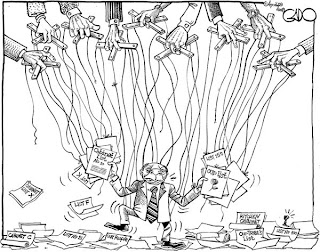
 The bandit government of Kenya is abetting crime and profound theft of public resources as well as destruction of the lives of our future generations. In this regard, the peoples' president and Prime Minister should not be in a hurry to be sworn in because he will be complicit in the illegalities of the state and what is more he will be bogged down by collective irresponsibility.
The bandit government of Kenya is abetting crime and profound theft of public resources as well as destruction of the lives of our future generations. In this regard, the peoples' president and Prime Minister should not be in a hurry to be sworn in because he will be complicit in the illegalities of the state and what is more he will be bogged down by collective irresponsibility.








